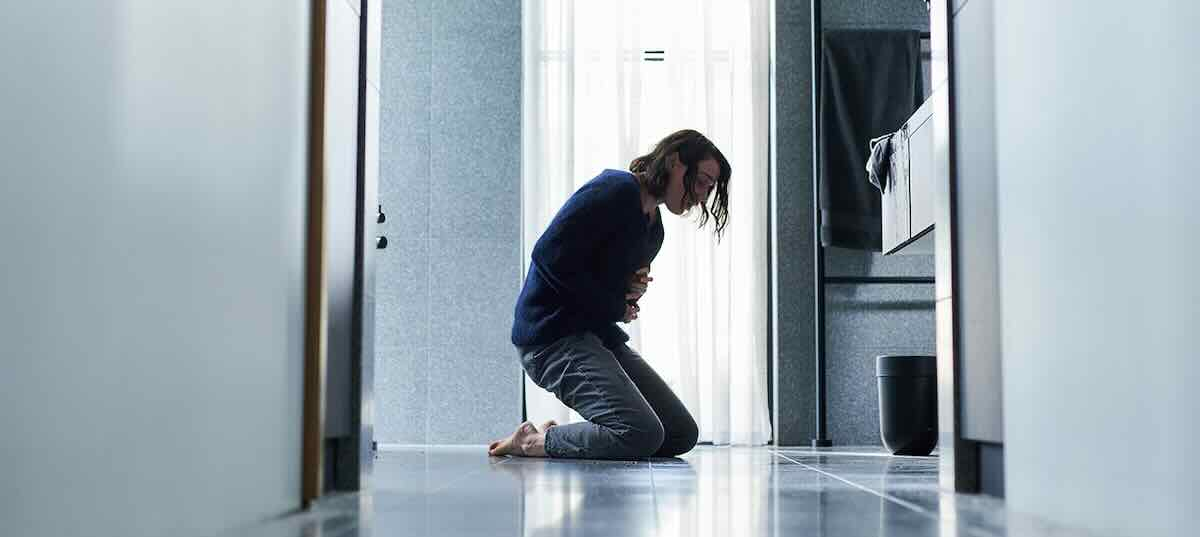
In the new Australian film Monolith, a podcaster hears from multiple callers about a mysterious black brick. They "receive" this thing, this artifact, after traumas and it wends its way into their consciousness and their very dreams. It takes over their lives and gives them violent and invasive visions. The podcaster's show, Beyond Believable, explores strange phenomenon. She follows leads who have similar experiences with strange bricks and starts connecting the dots.
She's identified only as The Interviewer and is herself a disgraced journalist. A big investigation she worked on went sideways, and she's exiled herself alone in a big home in the middle of the woods. She's trying for a comeback: "I don't need a break, I need a story," she tells her editor. "A career-defining story." She’s sure she's on to something with these black bricks and is on the verge of a revelation. About a conspiracy? About alien visitors? About the end of humanity?
Monolith is a chamber piece directed by Matt Vesely and written by Lucy Campbell, both whose credits include shorts, online series, and Australian TV work. All the action takes place with one character in and around a very modern open plan house whose floor-to-ceiling windows look out on blank woods.
The filmmakers cite Denis Villeneuve's Arrival as an inspiration, but their ambitions are too spare and their budget is too low for that model. It's like remaking Dune without the sand. Monolith more resembles Alex Garland's Ex Machina in its emphasis on a remarkable manmade structure and its relation to nature.
Narrative structure is the issue with Monolith. Its first fifteen minutes is an exposition dump, a montage of headlines and screenshots about a character we don't know yet and don't have empathy for. We're told too much in the beginning and shown too little later on.
Actor Lily Sullivan (Evil Dead Rise and Netflix's I Met a Girl) is the only character onscreen. While Ms. Sullivan has an appealingly resonant voice, she doesn't have the presence to carry off an entire film. She's left "jumping at shadows," as her character complains, rather than going through significant actions. She's feisty on the phone with a reticent source. "I'm sure it's challenging to remain ethical in your industry," she says sarcastically, but it's unclear if she's insulting the source or the mirror.
Her only interactions are with her callers. The twelve voice actors listed (some quite well-known, like Ansuya Nathan of HBO Max's The Tourist, and Damon Harrimen, Charles Manson in Once Upon a Time in Hollywood) give her expressive support. But they are voices on a phone. The only character we see and follow is The Interviewer. And watching one person, regardless of how compelling, respond to voices on a phone, regardless of what they’re saying, makes for a flat cinematic experience.
Director of photography Michael Tessari's muddy palate makes it all dour instead of spooky. (One stirring image, genuinely creepy, is used on the poster to misleading effect, making the film seem bigger than it is). Composer Benjamin Speed's and Leigh Kenyon's sound design is mostly the blips we've come to expect from low-fi sci-fi like this.
Monolith wants to belong to the same class as Shane Carruth's Primer or Andrew Patterson's The Vast of Night, no-budget movies that make up for it by trafficking in ideas that tickle the intellect. Monolith's implications are vague and its execution derivative.
(A quibble: why is her podcast called Beyond Believable and not simply Beyond Belief? Granted, actual podcasts are called that. Titles aren’t copyrighted. There are other recent movies called Monolith, for example.)
Monolith isn't bad, exactly. It's just underbaked, visually and thematically. Its premise is intriguing and deserves more thoughtful exploration. Maybe the filmmakers could expand upon it with a bigger budget and deeper revision.
_____________________________________________________
Monolith. Directed by Michael Tessari. 2022. Released by Well Go USA Entertainment. In theaters and on digital platforms and Blu-Ray. 95 minutes.
